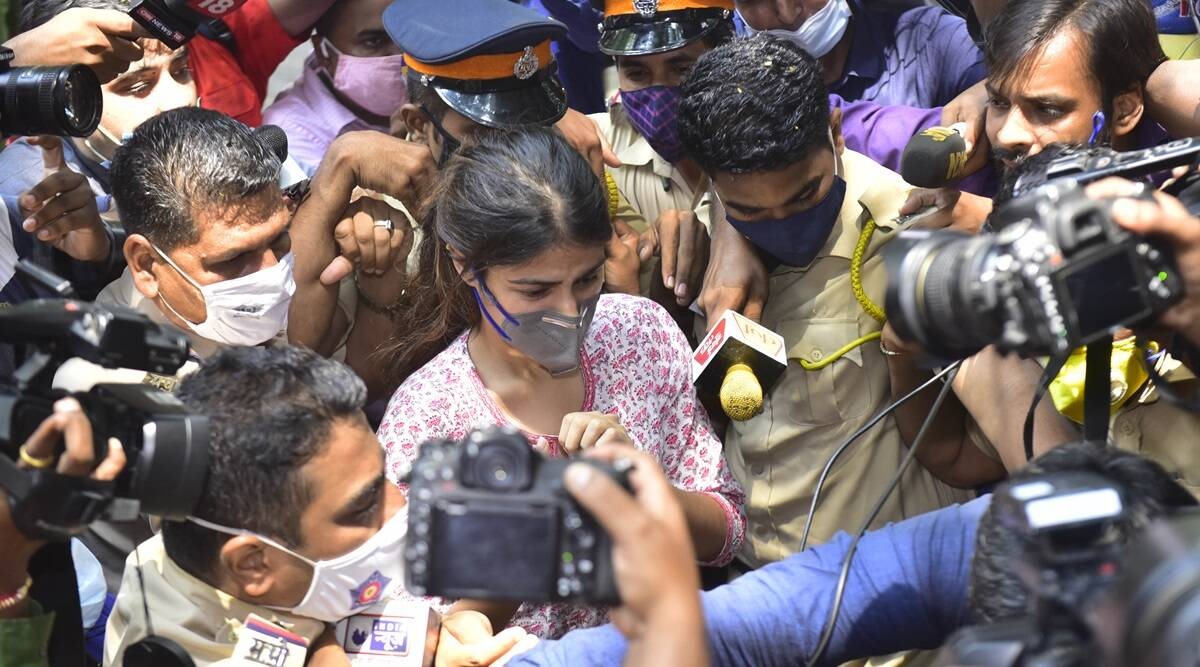 Media trial interference with justice TV channels must follow Press Council guidelines on suicide: Bench.
Media trial interference with justice TV channels must follow Press Council guidelines on suicide: Bench. Ruling that “trial by media” of cases under investigation is an “interference with administration of criminal justice,” the Bombay High Court Monday said the reportage of Republic Television and Times Now in the Sushant Singh Rajput case was “prima facie contemptuous”, with both channels running a “vicious campaign” playing the roles of “the investigator, the prosecutor as well as the judge”.
Ruling on PILs filed by former police officers from Maharashtra, as well as activists, lawyers and NGOs, seeking restraining orders against a “media trial” in the Sushant Singh Rajput death case, the bench of Chief Justice Dipankar Datta and Justice Girish S Kulkarni was scathing in its indictment.
“In an attempt to out-smart each other (for reasons which we need not discuss here), these two TV channels started a vicious campaign of masquerading as the crusaders of truth and justice and the saviours of the situation thereby exposing, what in their perception, Mumbai Police had suppressed, caring less for the rights of other stakeholders and throwing the commands of the CrPC and all sense of propriety to the winds,” the court said in its 251-page verdict.
It said the two TV channels “took upon themselves the role of the investigator, the prosecutor as well as the Judge and delivered the verdict as if, during the pandemic, except they, all organs of the State were in slumber”.
The court went on to observe that even if news reports are considered to be mere “insinuations and aspersions against Mumbai Police and actress Rhea Chakraborty, they lack bonafides, are aimed at interfering with and/or obstructing administration of justice and have propensity to shake the public confidence in the capability of police machinery and efficacy of judiciary.”
The bench said while it was refraining from taking action against these channels, “we hope and trust that they shall act more responsibly in future and not create a situation for the Court to take recourse to legal provisions.”
The court asked the media to avoid analysing the version of victims whose evidence could be vital at the trial stage, from publishing any confession allegedly made to a police officer by an accused and “trying to make the public believe that the same is a piece of evidence”.
The court said such “media trial”, pending the investigation of any police case, violates the Programme Code under the Cable TV Network Regulation Act.
“In our considered opinion, telecast of reports/ discussions /debates/interviews by these TV channels on the death of the actor and events subsequent thereto, brought on record by the petitioners is, prima facie, contemptuous having ingredients of criminal contempt…”
The court directed that TV news channels must follow guidelines issued by the Press Council of India, a print media watchdog, on reporting cases of death by suicide until new guidelines for electronic media are framed by the Central government and associations regulating electronic media.
The court also accepted the accusation by petitioners that the Union Ministry of Information and Broadcasting (MIB) had “abdicated statutory functions” of calling for accountability or implementing the law on television coverage of the Sushant Singh Rajput death case.
CJ Datta, pronouncing the judgment, said the bench had answered questions and concerns raised by the petitioners “to strike a balance between freedom of speech and expression and right to fair trial and to what extent, if at all, media reporting that impacts the probe can be restricted.”
“While one cannot ignore that but for the media’s intervention, the criminals in the Priyadarshini Mattoo case, the Jessica Lal case, the Nitish Katara case and the Bijal Joshi case could have escaped unpunished, overzealous ‘investigative journalism’ in cases that are sensitive and are capable of arousing interest among the masses has led to comments/observations … which may qualify as instances of obstruction to ‘administration of justice’, calling for judicial scrutiny,” the High Court added.
In light of the August, 2020 Supreme Court judgement that transferred the actor’s death probe to the Central Bureau of Investigation (CBI) and did not pass any adverse remarks against the Mumbai Police probe, the court noted: “Mumbai Police cannot be accused of any wrongdoing by the electronic media and prima facie, the criticism seems to be not fair.”
The bench added, “The petitioners, former police officers, could be justified in their concern that persistent criticism could bring down the morale of the police force and prove counterproductive and, therefore, utmost care should be taken to present reports that are tested and found to be true and correct. Any biased information or incorrect reporting may damage not only the good and clean reputation of a police officer, built over the years, but also the institution to which he belongs.”
But the court added that this is “neither the stage to give Mumbai Police a certificate of conducting necessary inquiry in actor’s death as per law nor to validate adverse reporting by electronic media. Any final opinion must await the verdict of criminal courts.”‘
The court accepted a suggestion that the Mumbai Police and other agencies could appoint an officer as a link between the media and investigators and hold periodic briefings in sensitive cases.
Disposing the pleas, the court clarified that its findings or observations in the verdict “are not reflection on the pending investigations.” And that criminal courts shall proceed to decide “based on materials before it, uninfluenced by any finding or observations herein.”